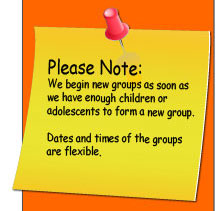| October 2008 - Volume 38 | |
| Helping Children and Adolescents Succeed Socially! | |
| The Social Skills Groups | Parenting Style |
|
The Kind of Parenting Style you Choose Can Help or Hurt Your Child.
We want to raise competent children. Growing children should not run the household or allow you to lose control. If your child or children are in charge before college, imagine when they are a teen or an adolescent. You will have power struggles at home and they will not have learned to listen to and respect you as parents. They will not respect themselves when they are like that. There is a good chance they will transfer that same disrespect onto other authority figures, perhaps teachers, coaches, baby sitters and camp counselors, even their peers. Learn about the three parenting styles and choose the Authoritative Parenting Style, because that one is the most successful, and the best way to parent. Set the rule now who is in charge. Why do children need direction and limits from their parents, teachers and other grown-ups in their lives? A few reasons:
There are three distinct parenting styles. They are Authoritative, Permissive, and Authoritarian. Different parenting styles will create different outcomes for children. I was part of a research study. I interviewed many young adults who had emotional disorders and many young adults who were free of emotional disorders. The findings were... The young adults who were free of emotional disorders came from parents who used the Authoritative Parenting Style without physical punishment. The young adults who had emotional disorders came from Authoritarian and Permissive parents and parenting styles. Research tells us that parenting styles affect children's psychological well-being, their academic success, and other aspects of their social and psychological adjustment, including adolescent problem behaviors such as aggression and drug and alcohol abuse.
Choose the Authoritative parenting style since it is considered to be the healthiest and most balanced approach to parenting. Authoritative parents set and enforce limits to show their love and care, and to protect their children. They are good listeners and respect their relationship with their children, and know the relationship should be a two-way relationship. They also engage and reason with their children when enforcing those limits. Authoritative parenting is a balance between Authoritarian and Permissive parenting styles. There are times when a parent needs to have their child obey them, regardless how they feel about it, and there are also times when a parent needs to allow their child to make mistakes and take chances without their interference. Remember, children learn from their parents and imitate them! Even the slightest behavioral nuances are picked up by our children, and acted out in their own lives. Styles of conflict resolution and the way parents conduct themselves will be imitated to some extent in their children's lives. Parents, the thoughtful intentional parent is the one who helps to create success in their children. Remember, the way you parent can help or hurt your child. Some ideas taken from: Jon Henshaw, M.A.Editor of Family Resource.com -- Susan Stern, LCSW is the founder of The Social Skills Place, Inc. |
| The Social Skills Place, Inc. :: 310 S. Happ Rd, Suite 201 :: Northfield, Illinois 60093 Office 847 446-7430 :: Cell 847 507-8834 :: www.socialskillsplace.com |
|
| (C) 2006-2021 :: All Rights Reserved :: Unsubscribe from our mailings |
